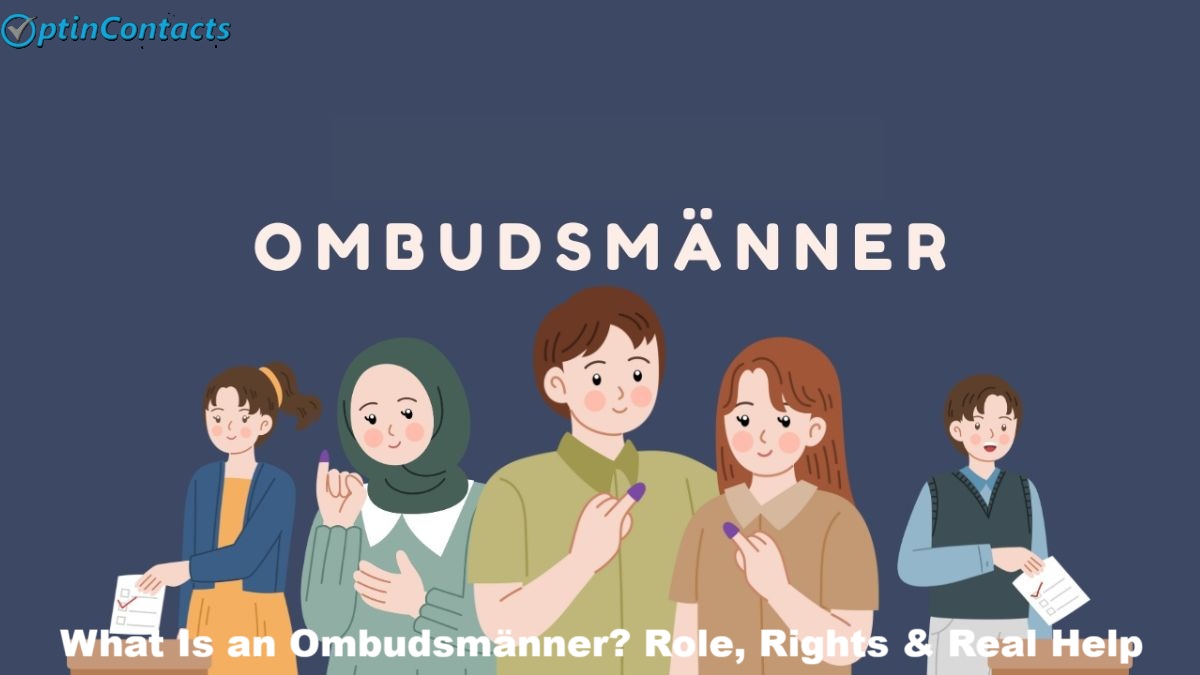What Is an Ombudsmänner? Role, Rights & Real Help
An ombudsmänner serves as an impartial and independent guide, helping people address concerns through fair and private resolution.
They operate in public institutions, private industries, universities, and healthcare, protecting rights and building trust.
Why Ombudsmänner Exist
Ombudsmänner offer an alternative to formal legal systems.
They give people a voice when facing power imbalances without needing a lawyer or going to court.
Their goal is simple: fairness, accountability, and resolution.
These professionals stand at the intersection of conflict and justice, helping individuals and organizations find common ground.
Roles and Responsibilities of Ombudsmänner
Listening With Care
Ombudsmänner begin by listening without judgment.
They collect facts and offer guidance based on fairness, not loyalty to either side.
Many are bound by strict confidentiality and ethical standards.
Resolving Disputes Peacefully
Rather than escalating issues, ombudsmänner mediate:
- They clarify misunderstandings.
- They uncover hidden dynamics.
- They propose solutions that restore relationships or improve policy.
Reporting Systemic Issues
In some roles, ombudsmänner can report patterns that affect more than one person.
This might include discrimination in an institution or abusive practices in a service industry.
Where Ombudsmänner Operate
Government and Public Services
Public ombudsmänner investigate complaints against government bodies.
In countries like Germany, Sweden, and Canada, they ensure civil servants act fairly.
They cannot enforce laws, but their recommendations often carry serious weight.
Finance and Insurance
Banking and insurance ombudsmänner resolve issues like:
- Unexpected fees
- Delayed payouts
- Policy confusion
They are essential when trust is shaken, offering outcomes without lawsuits.
Universities and Research Institutions
Academic ombudsmänner handle concerns about:
- Research integrity
- Faculty-student conflicts
- Harassment or bias
They offer both a safe space and a path to institutional change.
Healthcare and Elder Care
In healthcare, ombudsmänner stand up for patients and families.
They mediate billing disputes, care concerns, and communication breakdowns.
The German Context: Ombudsmänner in Action
Germany has a long history of ombuds mediation.
Some common types include:
- Versicherungsombudsmann – insurance mediator
- Bankenombudsmann – for banking issues
- Bürgerbeauftragte – for general citizen complaints
- Forschungsombudspersonen – in universities
Many are certified by independent organizations, reinforcing neutrality.
Example:
In 2023, Germany’s insurance ombudsmänner handled over 17,000 consumer complaints—most resolved without court proceedings.
BaFin, the federal financial authority, noted a 62% rise in regulated complaints, many handled via ombuds channels.
What Makes Ombudsmänner Effective?
Independence
They operate separately from the systems they oversee.
This independence builds trust and integrity.
Accessibility
Ombudsmänner are free to access and don’t require legal representation.
For many, they are the first safe point of contact.
Confidentiality
Sensitive issues remain private.
Most ombudsmänner do not disclose your identity without consent.
Speed
Most complaints are resolved in weeks, not months or years.
This is crucial when urgency or emotional strain is high.
How to Reach an Ombudsmänner
- Visit the organization’s website (e.g., a bank, university, or insurance provider).
- Search for “Ombudsmann” or “Beschwerdestelle.”
- Submit a written complaint with supporting documents.
- Wait for a confirmation and response process.
Always ask:
- Is the ombudsmann independent?
- Will my identity be protected?
- How long will the process take?
What to Include in a Complaint
Clear Summary: Describe what happened.
Key Facts: Dates, names, relevant documents.
Desired Outcome: What resolution do you seek?
Tone: Be respectful, factual, and brief.
Tip: Think of your letter like telling a calm, clear story. The ombudsmann is not your enemy—they are your ally in finding fairness.
Real-World Story: When an Ombudsmänner Changes Everything
A 68-year-old retiree in Berlin was denied a health insurance claim after emergency surgery.
He felt helpless and unheard until a friend recommended the Versicherungsombudsmann.
After submitting a complaint and two documents, the ombudsmann contacted the insurer.
Within 21 days, the insurer reversed its decision and covered the cost fully.
The man later said:
“I didn’t know people like this still existed calm, helpful, and neutral.”
This is the quiet power of ombudsmänner: behind-the-scenes justice.
Limitations of Ombudsmänner
While incredibly valuable, ombudsmänner do have limits:
- Not legally binding in all cases (unless agreed by contract)
- Cannot punish wrongdoing only recommend
- May be ignored by powerful entities (though reputational risk helps)
That said, their influence is growing. Many governments and industries now rely on them to improve systems and maintain trust.
Ombudsmänner vs. Legal Action
When to use an Ombudsmann:
- You want a faster, informal solution
- You’re not seeking financial damages
- You’re unsure what went wrong but want to be heard
When to seek legal advice:
- You’re facing discrimination, violence, or unlawful termination
- Money or freedom is at risk
- The issue is already in court
The two approaches are not mutually exclusive.
Often, ombudsmänner help prevent the need for court altogether.
Conclusion
Ombudsmänner are a bridge between individuals and institutions.
They offer a respectful, confidential space where conflict can become clarity.
By listening deeply, mediating fairly, and recommending change, they play a crucial role in modern justice.
What You Can Do Next
- Identify the right ombudsmann in your country or organization
- Prepare a simple complaint with facts and documentation
- Expect transparency, professionalism, and fair consideration
- Use their findings to advocate for broader change, if needed
Remember: Ombudsmänner don’t take sides, they take your voice seriously.
Whether you’re a student, employee, patient, or citizen, you deserve to be heard.
And ombudsmänner are here to listen.
